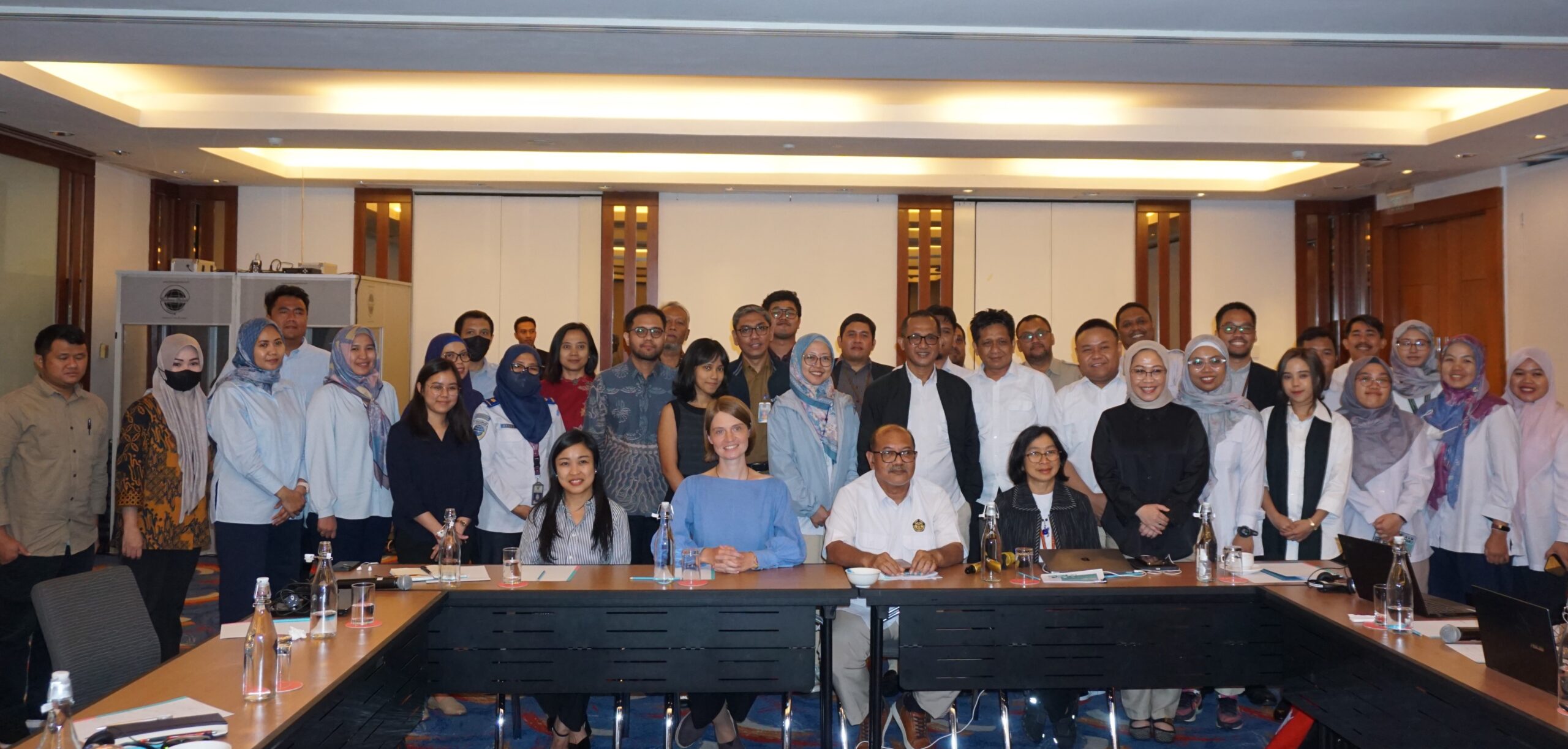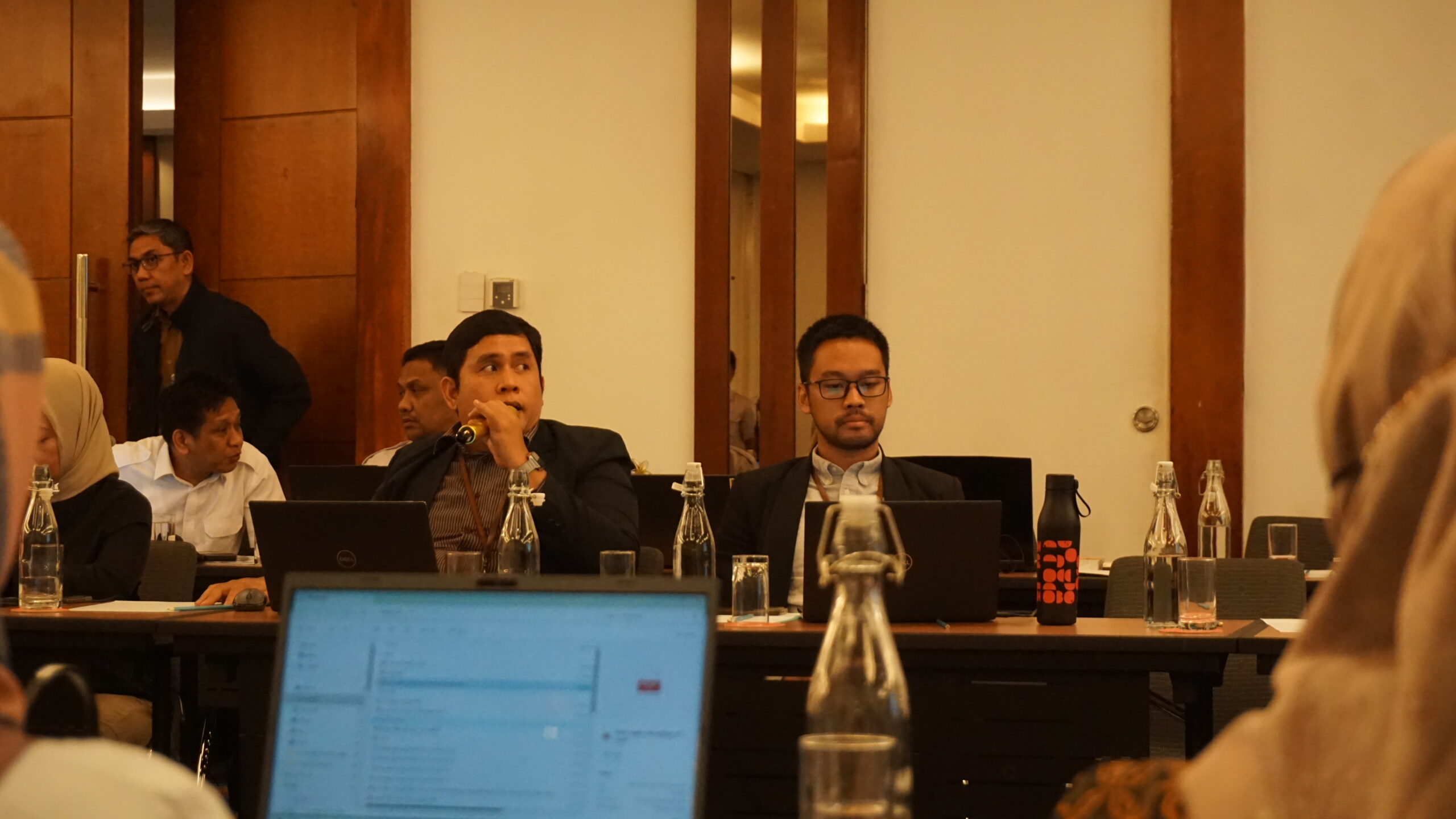Menu

Photo 1. Group photo of the participants
On 24 September 2024, the Ministry of Public Works and Housing of Indonesia hosted the 1st Project Steering Committee (PSC) meeting for the Asia Low Carbon Buildings Transition (ALCBT) project in Jakarta, Indonesia. The kick-off meeting serves as the project’s launch in Indonesia, bringing together key stakeholders to align on the project’s vision, scope, objectives and outcomes, as well as to review the project implementation progress and plans and communicate roles and responsibilities. In attendance were representatives from the Indonesian government, including officials from the Ministry of Public Works and Housing (PUPR) and the Ministry of Energy and Mineral Resources (MEMR), representatives from the German Embassy in Jakarta, the Global Green Growth Institute (GGGI), HEAT International GmbH, and the ASEAN Centre for Energy (ACE). The attendance of PT. SMI, Ministry of Transport and Sub-National Governments was also acknowledged.
The meeting commenced with opening remarks from Diana Kusumastuti, Director General of Human Settlements at PUPR. Diana emphasised the project’s alignment with Indonesia’s goal of reducing greenhouse gas emissions by 1.91 trillion tons of CO2 by 2030. She expressed hope that the ALCBT project would support Indonesia’s efforts in developing net-zero emissions tools and establishing financing mechanisms for green building retrofits. Hendra Iswahyudi, Director of Energy Conservation at MEMR, followed with remarks on Indonesia’s energy management strategies. He highlighted the country’s efforts in improving energy efficiency across various sectors, including buildings, and the potential for energy savings through improved building management and technology adoption.
Maike Lorenz, Climate and Environment Head at the German Embassy in Jakarta, emphasised the often-overlooked importance of the building sector in climate protection efforts. She expressed satisfaction that the project focuses on this crucial area across five countries, including Indonesia. Gusti Satya Wira Tenaya, Energy Lead at GGGI Indonesia, provided an overview of GGGI’s role in the project. He highlighted GGGI’s status as an intergovernmental organisation, stressed GGGI’s commitment to delivering the project’s outputs and expressed hope for significant contributions to Indonesia’s sustainable development over the coming years.

Photo 2. Opening Remarks by Beni Suryadi, Acting Executive Director of ACE
Beni Suryadi, Acting Executive Director of ACE, addressed the meeting virtually. He underscored ACE’s role in supporting the technical aspects of the project, particularly in areas related to energy efficiency in buildings. Suryadi highlighted the project’s alignment with the ASEAN Plan of Action for Energy Cooperation (APAEC) 2021-2025 and its contribution to Indonesia’s commitment to reducing greenhouse gas emissions. He emphasised the project’s unique opportunity for regional cooperation and knowledge sharing among ASEAN Member States.
The meeting featured crucial directives from PUPR and MEMR. Diana called for a holistic approach to green building implementation, noting the necessity of strengthening policies, accelerating implementation, and boosting public support through information technology. She outlined the ministry’s dedication to developing net-zero emissions scaling tools and enhancing technical capacity across government, industry, and the banking sector. Hendra detailed the ministry’s energy conservation strategies, including the rollout of minimum energy performance standards and labeling for building equipment. He pointed out the significant potential for energy savings in the building sector, stating that even a modest 10% improvement in energy efficiency could yield substantial cost savings and emissions reductions.
GGGI, as the consortium lead, presented an overview of the project’s progress in Indonesia. Julie Robles, ALCBT Project Manager at GGGI, and Ambolas Manalu, ALCBT Project Lead in GGGI Indonesia, reported on the ongoing study consolidation to develop modeling scenarios for the zero-emission building sector up to 2050. Robles highlighted the institutional mapping process and the upcoming discussions with government partners and industry stakeholders about the modeling approach. GGGI also announced plans to select a pilot city by October and commence work on building a registry in the chosen location.

Photo 3. Presentation by Rio Jon Piter Silitonga, Senior Officer of CEE at ACE
Rio Jon Piter Silitonga, Senior Officer of Energy Efficiency and Conservation (CEE) Department at ACE, shared progress on major deliverables while highlighting key challenges in energy efficiency investment in Indonesia, including lack of investor trust and concerns about profitability. To address these, he discussed the development of a Regional Building Energy Efficiency Database and Investment Platform to validate project data and increase investor confidence, as well as Green Public Procurement Guidelines for Energy Efficient Cooling to stimulate supply and demand on sustainable cooling. The beta version of the platform and tool is expected to be tested by Q3 2025. Rio also presented ACE’s energy management training programme targeting 100 professionals by Q2 2028 and ongoing research on ESCOs and on-bill mechanisms to identify market gaps and pilot business models. These initiatives collectively address knowledge gaps, provide innovative financing mechanisms, and boost energy efficiency investments in Indonesia’s building sector.
Herlin Herlianika, representing HEAT International, explained their role in the project, particularly in developing tools for Life Cycle Analysis (LCA) of buildings and Measurement, Reporting, and Verification (MRV) systems. She stressed the importance of considering embodied and operational carbon in assessing a building’s environmental impact.
Following the progress updates, the meeting discussed the project’s workplan. The PSC reviewed the progress made in the initial implementation phase. Key accomplishments highlighted included the commencement of the modeling scenario study, initial steps towards selecting a pilot city, and the development of standardised tools for carbon assessment in buildings. The committee expressed satisfaction with the groundwork but emphasised the need for accelerated action in the coming year.
The committee also discussed the challenges of coordinating efforts across various ministries and sectors. They stressed the importance of clear leadership and well-defined roles for different stakeholders to ensure effective implementation. Another key point of discussion was the balance between pushing demand for low-carbon building materials and encouraging supply from the industry. The committee agreed on the need for a coordinated approach that addresses both aspects simultaneously. Financing mechanisms for green buildings were also extensively discussed. The committee explored options for making green building loans more attractive, potentially through lower interest rates or other incentives.
After thorough deliberation, the PSC approved the workplan for 2025, with the understanding that it would remain flexible to accommodate emerging needs and opportunities. The committee also agreed on the need for regular communication and updates to ensure the project stays on track and continues to align with Indonesia’s sustainable development goals.
The ALCBT project is a five-year initiative supported by the Federal Ministry for Economic Affairs and Climate Action of Germany under its International Climate Initiative (IKI) to promote low-carbon buildings in Cambodia, India, Indonesia, Thailand, and Viet Nam. The project is being implemented by a consortium led by the Global Green Growth Institute (GGGI) with HEAT International, ASEAN Centre for Energy (ACE), and Energy Efficiency Services Limited (EESL) as consortium partners. The project aims to develop tools for managing building carbon emissions, enhance stakeholder capacity, establish financing pathways, and promote knowledge sharing. In Indonesia, the project partners with the Ministry of Public Works and Housing as well as the Ministry of Energy and Mineral Resources to further contribute to Indonesia’s effort to reduce 1.91 trillion tons of CO2 through energy efficiency efforts by 2020 and contribute to the broader goal of reducing 1.3 trillion tons of CO2 in green buildings and 14 trillion tons in commercial buildings by 2030. The project supports the country’s efforts in energy management, particularly in government and commercial buildings, aiming to save around 500 tons of oil equivalent per year in the building sector and ultimately contributing to Indonesia’s roadmap for achieving net-zero emissions in the energy sector by 2060.”
